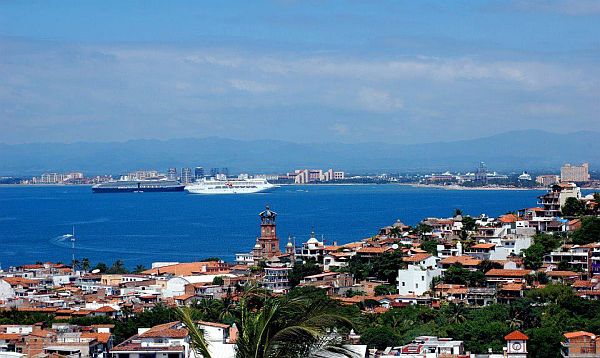For those who still think that Puerto Vallarta is a sleepy fishing village (which it was in 1968) it certainly isn't today. It has become very cosmopolitan in the last decade, especially with the abundance of cranes building more and more accommodations in the downtown area known as "Old Town."
This heralds a shift from the craze of Nuevo Vallarta. This was inevitable, I suggest, however it was a long time coming. Puerto Vallarta has that Mediterranean look, (thanks to Guillermo Wulff) and the vibrant community feeling, unlike Collins Avenue in Miami Beach and, frankly, Nuevo Vallarta with rows of hotels and condos lined shoulder-to-shoulder along the beach.
Old Mexico Charm with Modern Conveniences
First of all, the main port is located in Puerto Vallarta and we have a Home Depot, albeit positioned neatly between the two. We have theatre, many movie houses and several casinos along with two prominent daily markets where restaurateurs and the public, both local and tourists, search for the latest and freshest fruits and veggies. Speaking of restaurants, we are blessed with a multitude and the best of the best. And we've had a COSTCO for the last four years. Paradise with stateside perks!
 |
What this means is that in the daytime we enjoy the onshore breezes, as does Nuevo Vallarta, but at night when this reverses as the thermal over the Bay now sucks the air back out to sea in Nuevo it is simply bringing back the same air flowing into the valley so the temperature difference is slight.
Having the mountains as a back drop, rising to 6000 feet within a mile or two of the shore, produces a large differential in temperature between night and day in Puerto Vallarta. This defies the claim of a subtropical climate as the difference between night and day is 5-7 degrees Celsius. In practice during the winter months this can be as great as 18 degrees making it very pleasant for sleeping. It also controls flying insects who become lethargic in cooler temperatures. A further element causing this phenomena is 'adiabatic effect' (Google this to learn what this is). Hint: It has to do with the Cuale River valley.
This climatic difference is little known to the public but it's enjoyed by the chosen few that live south of the Sheraton in town. If you're thinking of renting or even buying something in this paradise of ours, consider the foregoing as an important factor in deciding. Granted this phenomena is not as prevalent in the summer time as cloud cover diminishes the onshore offshore effect during the time we need it the most... the rainy season.
Mind you the rainy season, which starts in mid June and lasts into October, is mostly in the form of heavy thunderstorms which begin at dusk and last an hour or two while allowing the stars to come out again around 2300 hrs. This produces a cooling effect most welcome and the cycle resumes once again in about three days as a rule. In the morning following a storm the air is clear as a bell having removed all the particles and pollution. It's invigorating to say the least. If you listen carefully you can 'hear' the plants growing. Maybe that's an exaggerating, but you can really 'see' the prolific growth.
All of this I was oblivious to back in 1968 when we first set foot in the lazy fishing village of 10,000 population, but we lucked out in choosing the location for both Hotel Casa Anita and Apartments Victoria and Misty located in Colonia 5 de diciembre, where we have nine long-term condo type suites.
Whatever you do, please include us in your vacation plans, either for a short week or two week stay at the hotel, or a long stay of 3 months to a year or more at our other properties. Click HERE to learn more about our long-term rental properties.
Long-time resident Bill Seymen is a member of the Puerto Vallarta Navy League and the owner of Hotel Casa Anita.


